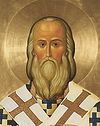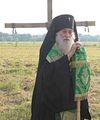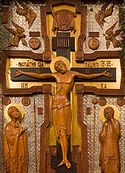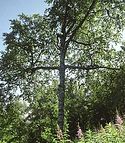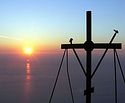

| Previous day | Next day |
| Old Style
March 18
|
Sunday |
New Style
March 31
|
|
Third Sunday of Great Lent. Adoration of the Holy Cross.
Tone 3.
Great Lent. |
Wine and oil allowed.
|
![]() St. Cyril, archbishop of Jerusalem (386).
St. Cyril, archbishop of Jerusalem (386).
Martyrs Trophimus and Eucarpus of Nicomedia (ca. 300). St. Aninas the Wonderworker, hieromonk, of the Euphrates.
10,000 Martyrs at Nicomedia. St. Tetricus, bishop of Langres in Gaul (572). St. Daniel, monk, of Egypt (6th c.). St. Edward, martyr and king of England (978). St. Cyril of Astrakhan (1576). St. Maria (Skobtsova), nun, who suffered at Ravensbruck (1945).
Repose of Abbot Mark of Optina Monastery (1909).
Thoughts for Each Day of the Year
According to the Daily Church Readings from the Word of God
By St. Theophan the Recluse

Third Sunday of Lent. [Heb. 4:14–5:6; Mark 8:34–9:1]
Whosoever will come after me, let him deny himself, and take up his cross, and follow me (Mark 8:34). It is impossible to follow the Lord as a crossbearer without a cross, and everyone who follows Him, unfailingly goes with a cross. What is this cross? It is all sorts of inconveniences, burdens and sorrows—weighing heavily both internally and externally—along the path of conscientious fulfilment of the commandments of the Lord, in a life according to the spirit of His instructions and demands. Such a cross is so much a part of a Christian that wherever there is a Christian, there is this cross, and where there is no such cross, there is no Christian. Abundant privileges and a life of pleasure do not suit a true Christian. His task is to cleanse and reform himself. He is like a sick person, who needs cauterization, or amputation; how can this be without pain? He wants to tear himself away from the captivity of a strong enemy; but how can this be without struggle and wounds? He must walk counter to all practices surrounding him; but how can he sustain this without inconvenience and constraint? Rejoice as you feel the cross upon yourself, for it is a sign that you are following the Lord on the path of salvation which leads to heaven. Endure a bit. The end is just around the corner, as well as the crowns!
Articles
 Martyrs Trophimus and Eucarpus of NicomediaThe Holy Martyrs Trophimus and Eucarpion were soldiers at Nicomedia during the persecution against Christians under the emperor Diocletian (284-305). |





